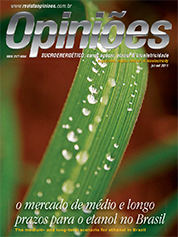Luiz Custódio Cotta Martins
President of Siamig
Op-AA-29
Brazil: the country of renewable diversity
Brazil has developed fantastic know-how in the production of ethanol, be it in agriculture, with the development of several sugarcane varieties adapted to the local climate, biological pest control, and new technologies in planting and harvesting, be it in the industrial field, with the build-up of an important industry on a nationwide basis, after several decades of development, with an industrial park of some 430 installed mills and the generation of about 1.28 million formal jobs.
The country now relies on the more intense implementation of flex-fuel technology, which has been applied in about 50% of the national vehicle fleet, in addition to the increasing growth of bio-electricity – the energy from sugarcane bagasse, whose production in 2010 for the Brazilian electric sector amounted to the energy needed by 20 million people.
Several uses of ethanol are also being implemented, such as in tests being performed in buses in São Paulo, along with the possibility of producing hydrocarbons as diesel oil from sugarcane, to be tested in the fleet in Rio de Janeiro.
Companies are already producing “green plastic”, with ethylene derived from ethanol, whereas the town of Juiz de Fora, in the State of Minas Gerais, is already operatingthe world’s first thermal plant to use this type of fuel, currently being tested by Petrobras.
Flex-fuel motorcycles already comprise 44% of all models manufactured in the first quarter of this year. In 2010, such vehicles represented only 18% of production according to ABRACICLO – the two-wheel vehicle industry’s class entity. The tendency is that this technology will grow proportionately in relation to the market, as is already the case of flex-fuel automobiles.
If, however, we reckon only with the potential of ethanol production for locally manufactured flex-fuel cars, estimates show that in 2020 they are expected to represent almost 70% of the fleet and the industry would need to double its current output of 27 billion liters to 54 billion liters/year.
There is no doubt the USA will open their market, with a new mobilization in the Senate to do away with subsidies and the tariff on imported ethanol, whereas California is already considering Brazilian ethanol as being of second generation.
Brazil is currently also the world’s biggest sugar producer and exporter, with 50% of the product’s exports. This product’s market trend is growth, mainly to Asian countries such as China and India, and the country will continue to be the world’s main supplier for this product.
According to the agro-ecological zoning undertaken by the Brazilian government, the country has more than 60 million hectares of anthropically prepared land available for the industry’s growth. In addition, starting in 2012, the first Brazilian ethanol pipeline will come on stream, allowing for considerable reduction of logistics costs.
To meet all such challenges, which rank Brazil as one of the most important players for agro-energy in the world, there is the urgent need for new investments at low interest rates, to benefit the sugarcane-based energy industry, allowing for the implementation of new sugarcane plantation areas, the renovation of already planted areas, the construction of new mills, investments in new technologies, the modernization of already existing mills, and the building of infrastructure to bring ethanol production to market, while seeking to be more competitive.
One also needs to create incentives for ethanol in view of fossil fuel – gasoline –, whose prices have been artificially stable at the refinery since 2005, notwithstanding the variations in the international oil price. Countries that heavily tax ethanol cannot compete with fossil fuels, be they gasoline, diesel oil, or natural gas for vehicles.
The measures currently being discussed in the National Petroleum Agency must take into consideration market safety, so as to cover the shortage of ethanol and to transform the country’s plans for making ethanol a commodity to reality. It makes no sense to threaten taxing sugar or prohibiting the export of ethanol as is currently being discussed in the media.
With government incentive initiatives and the creation of a regulatory framework with short-, medium- and long-term measures, debated and approved by the National Congress, the industry will certainly be capable of meeting its environmental production needs of the renewable fuel that emits less than 89% of CO2 to the atmosphere, in comparison with gasoline, and to contribute to cleaning up the energy matrix of other countries, while providing better quality of life to all of us.




